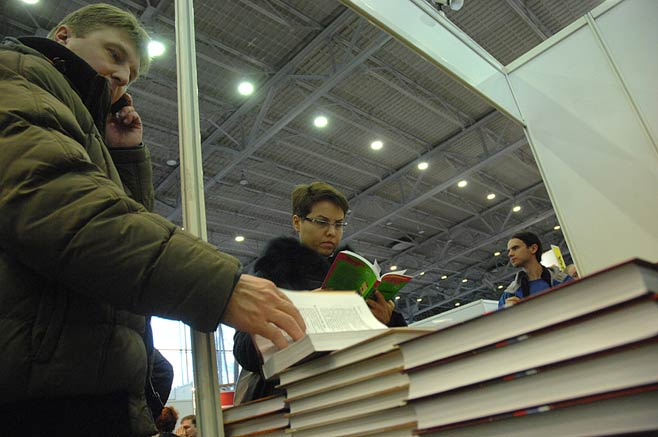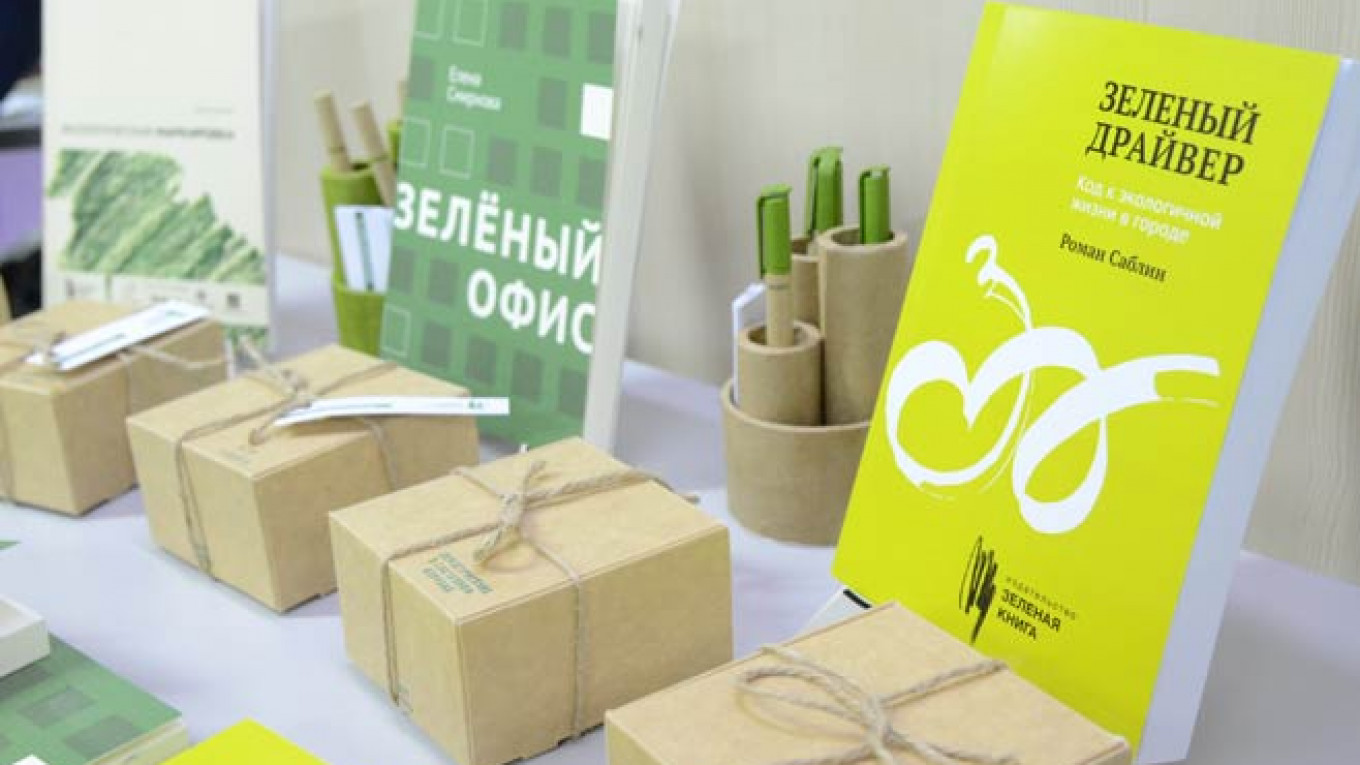In Russia, a country where environmental pollution is a major problem, various projects aimed at protecting nature have started to emerge in recent years. Yekaterina Voronina, an ardent advocate of this new movement, decided to set up a publishing house based on green technologies and issue books on environmental issues.
When Yekaterina decided to start the project two years ago, she had a Ph.D. in environmental studies, a shelf of books about running a company and no real business experience whatsoever. However, this did not frighten her and even made her more enthusiastic.
"Studying at the Mendeleev University of Chemical Technology for a second degree, I realized there are no books in Russia about practical ecology. How do you make your office eco-friendly? How do you find out which products harm the environment, and which do not? All these questions were left unanswered for the Russian reader," Yekaterina said in an interview.

Yekaterina Voronina
So she started thinking how to fill the gap. As she did not have any experience in book publishing she decided to apply for a position of a sales manager in a big Russian publishing house to gain some practical skills. However, she was not offered the position. This disturbed her slightly, but gave her the drive to carry on and accomplish her goal — create her own publishing house.
Yekaterina and four other partners made a joint effort to set up a company. They raised 100,000 rubles ($2,800) as a starting capital. This is how Zelyonaya Kniga, or Green Book, was born.
"When I started the whole thing, no one really believed I could succeed. Everybody was looking at me like I was crazy," Voronina said. However, to Yekaterina the whole idea seemed so ingenious, that she just had to carry on.
As the company celebrated its second birthday in March this year, the results were remarkable. Green Book has published three books with significant circulations for such niche literature, with about 3,000 copies printed per book. In 2012 all debts were repaid and turnover for 2013 reached 5 million rubles ($140,000), which for so small an eco-startup is a significant achievement.
Green Book tries to keep its ecological footprint to a minimum. The paper for books is either recycled or certified by the Forest Stewardship Council of Russia, a body that checks whether the paper is made from sustainably grown and harvested woods. The ink for the paper is water-based, which is considered to be the most ecologically friendly.
Besides, the company calculates the carbon footprint of production. The footprint actually shows the amount of greenhouse gases released into the air during the production process. To compensate for the harm done to nature, which is inevitable, Yekaterina and her colleagues plant trees. So in the end, the books become 100 percent eco-friendly.
Green Book strictly follows the rules of ecological production. The company does not even have an office. Voronina realized that her firm did not really need one and could reduce the consumption of energy and resources by working from home. "The whole team works remotely. Our designer, for example, works in Vladimir, the software specialist is from Chelyabinsk. We communicate with each other using Skype and e-mails, so this suits us perfectly well," Voronina said.
"Our main goal is environmental enlightenment. We are trying to educate our reader and raise his or her level of environmental awareness," Voronina said. She tries to find Russian environmental gurus, who can become the future authors for her publishing house. However, she recently decided to turn to foreign literature and translate "Greening Your Business" by Daniel Sitarz, a U.S. attorney and entrepreneur, who has published more than 30 business and legal books. He was quick to reply to Yekaterina's request and they made a deal to publish the first translation of his work into Russian.
"It is really hard to define who our reader is," Yekaterina said. However, the core audience of the publishing house is already taking shape. Although readers have a wide variety of ages and occupations, they are all keen about environmental issues and eco-life. They want to know where to buy eco-products, want to raise their child in a clean environment, and want to live a life causing minimum harm to the nature.
The publishing house works mainly with online shops. "We have suspended our cooperation with the big bookstores as it is not really useful for us. Our product is usually lost in the vast variety of literature. Besides, the major players in the market sell our books with a big retail margin, which we cannot accept," Voronina said. Now Green Book also cooperates with small shops for eco-products and niche book stores.
"We fully support Green Book project, as it is an example of sustainable and environmentally oriented production," said Andrei Shardin, executive director of the fund Russky Uglerod, or Russian Carbon, which helps businesses switch to eco-friendly production. He added that while there are some other Russian publishing houses using paper certified by the Forest Stewardship Council, Green Book is the most prominent one.

Muscovites browsing at a book fair, a sales model Green Books eschews.
"As long as the they keep the standard high in terms of content quality, they will be successful," said Yelena Smirnova, development director at eco-bureau Greens. Smirnova has cooperated with Voronina and is the author of the book "Ecolabeling," published by Green Book. Smirnova said Voronina's company is still a small niche project, but may expand further and has big prospects.
Smirnova said although eco-business is now developing in Russia, it is still far behind what is happening in Europe and the U.S. One of the key problems is that neither the government nor the commercial sector support eco-projects. Investors are really not interested in that kind of startup.
"Government support is not a panacea. The main problem in Russian eco-business is that we do not have strong leaders in the industry," said Maria Shuvalova, an environmental activist and entrepreneur running Green Lamp, a project dealing with urban greening. "The eco-sector needs more support from different NGOs and funds, which can provide financial aid to various environmental initiatives," Shuvalova said. She herself has run several ecological startups, but had to close some of them as they proved to be too expensive.
Voronina, however, is not afraid of problems and is planning to expand her company further. After two years in the publishing house, she realized that hardships and not success, both in business and in personal life make one stronger and teach how to carry on.
She set herself a new goal to publish 12 books a year. Her secret dream is to see someone in the metro reading her books. "This would make me really happy and will make me sure I am doing the right thing," Voronina said.
Contact the author at [email protected]
A Message from The Moscow Times:
Dear readers,
We are facing unprecedented challenges. Russia's Prosecutor General's Office has designated The Moscow Times as an "undesirable" organization, criminalizing our work and putting our staff at risk of prosecution. This follows our earlier unjust labeling as a "foreign agent."
These actions are direct attempts to silence independent journalism in Russia. The authorities claim our work "discredits the decisions of the Russian leadership." We see things differently: we strive to provide accurate, unbiased reporting on Russia.
We, the journalists of The Moscow Times, refuse to be silenced. But to continue our work, we need your help.
Your support, no matter how small, makes a world of difference. If you can, please support us monthly starting from just $2. It's quick to set up, and every contribution makes a significant impact.
By supporting The Moscow Times, you're defending open, independent journalism in the face of repression. Thank you for standing with us.
Remind me later.






